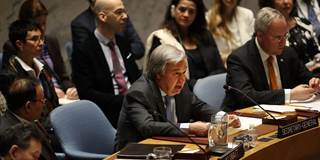In the face of violent conflicts that are producing widespread death and destruction, the UN and its most powerful members have a responsibility – as stated in the UN Charter – to do whatever they can to restore peace. They have exercised power without responsibility for too long.
CAIRO – When the United Nations was founded, its primary goals, as stated in its Charter’s preamble, included saving future generations from “the scourge of war” and reaffirming “faith in fundamental human rights.” More than 70 years later, the world has more – and more advanced – weapons than ever, and armed conflicts are raging worldwide, resulting in large-scale death and suffering of combatants and civilians alike.

CAIRO – When the United Nations was founded, its primary goals, as stated in its Charter’s preamble, included saving future generations from “the scourge of war” and reaffirming “faith in fundamental human rights.” More than 70 years later, the world has more – and more advanced – weapons than ever, and armed conflicts are raging worldwide, resulting in large-scale death and suffering of combatants and civilians alike.